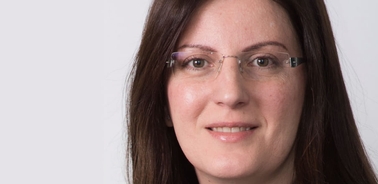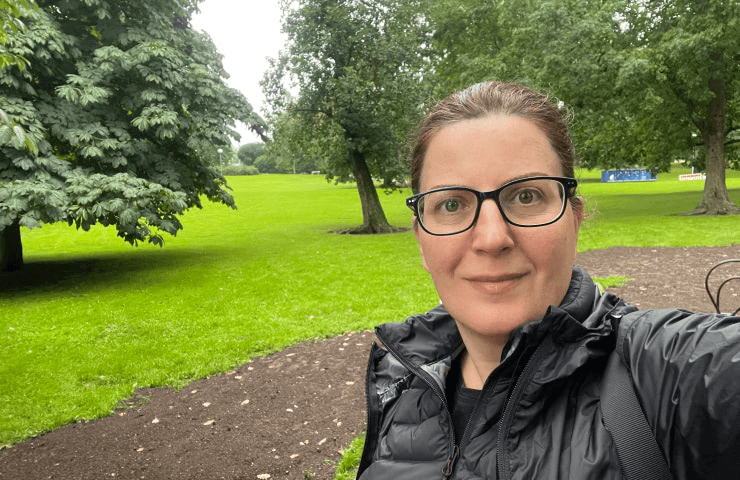Faculty Spotlight: Mayte Ballestar

Meet one of IE’s School of Science and Technology most influential thought leaders.
As an executive with a distinct blend of academic and research expertise, Mayte Ballestar brings twenty-five years of transformative experience across IT, banking, retail, pharmaceuticals, and BigTech sectors. Her leadership breaks through conventional boundaries, championing data-driven decision-making, digitalization, and AI integration to generate significant positive impacts on both business and society. In her current role as Head of Analytical Consultants at Google—as well as in her previous roles at other top companies--she has spearheaded large, diverse, and multicultural teams on projects spanning from local to global scales and has made significant contributions to tech startups as an Advisory Board member.
Ballestar is a statistician who also holds a PhD in Applied Economics and has published 20 scientific articles in top-tier journals, two of which have won international awards. Her academic contributions as a researcher and associate professor have focused on the integration of data science, big data, and AI with practical business implementations, especially in e-commerce, public policy, digital transformation, and AI adoption. Recognized globally, she has served as a visiting researcher at prestigious institutions like the University of Bath and the Finnish Center for Artificial Intelligence at Helsinki University, as well as at the Research Group on Social Sustainability and Welfare Policies, LUT University in Finland.
Meet one of the top thought leaders at IE School of Science and Technology.
At IE School of Science and Technology, we talk a lot about being built to breakthrough. What has been your biggest professional or personal breakthrough and why?
My most significant and recent professional achievement was joining Google as the Head of Analytical Consultants. In addition to this milestone, completing a PhD and later becoming an associate professor while working full-time in leadership positions at multinational firms was not only an intellectual challenge but also a personal one.
It took a lot of dedication and focus to achieve my dreams. These experiences have made me a better leader and problem-solver, showing how important it is to keep going, think strategically, and manage time well in both academia and the business world.
What brought you to IE? Where were you before? And what keeps you here?
I am passionate about teaching and mentoring, aiming to inspire younger generations to embrace statistics and computer sciences as enthusiastically as I do. I was fortunate to have encountered key figures throughout my personal, academic, and professional journey who encouraged me to excel in these subjects, which have always been my favorites. They helped me overcome gender boundaries and stereotypes, along with other challenges.
My goal is to show students that these disciplines are not only fascinating but also powerful tools for contributing to society in a rapidly changing world filled with challenges. I aim to convey the relevance and potential of these fields in solving real-world problems, empowering students with the knowledge and skills they need to make a positive impact.
This is why I combine my professional career as Head of Analytical Consultants at Google with my academic activities, researching and teaching. I aim to bridge the gap between the academic and practitioner worlds, enriching both with the best of each.
What trends are you most excited about in science and technology and why?
I have a profound interest in AI, particularly in Large Language Models. For several years now, I have been conducting research in the field of AI alongside colleagues in Spain, as well as at the Finnish Center for Artificial Intelligence at the University of Helsinki, LUT University in Finland, and the University of Bath in the UK. This research has led to the publication of several scientific articles, exploring these compelling topics from a dual perspective.
Firstly, as a statistician, I am deeply interested in the statistical methods that power AI, which are crucial for solving a variety of research questions such as analyzing unstructured data, time series analysis and forecasting, segmentation, and classification, among others. Secondly, I am keenly interested in analyzing the potential opportunities AI presents in society, especially in terms of how it can benefit companies and their workforces.
Have you ever had an a-ha moment while teaching that furthered your research? What was it?
On many occasions, explaining complex analytical concepts in my classes and having insightful conversations with my students have inspired some of my research. I love teaching and especially enjoy serving as a mentor for capstone projects and being the technical director of Datathon events. These initiatives are great opportunities to help students grow and prepare for real-world challenges in their future roles as data analysts and data scientists. They also create a space for meaningful discussions, reflecting on various analytical issues, and coming up with solutions that benefit both companies and society.
What book do you wish your students would read before taking your class and why?
Andriy Burkov's "The Hundred-Page Machine Learning Book" is a fantastic resource that I would advise my students to read before enrolling in my classes. It covers the fundamental ideas and algorithms of machine learning, allowing them to more quickly assimilate basic knowledge and interact more successfully with the more complex subjects I teach. This book is especially helpful because it provides simple, understandable explanations that even beginners can understand, guaranteeing that every student starts at the same level.
Please name one of your articles or studies you feel addresses the pressing issues for 2024?
"Why is your company not robotic? The technology and human capital needed by firms to become robotic." In the Journal of Business Research 142 (2022): 328-343.
This is one of my favorite scientific articles because it significantly contributes to the literature by explaining the impact of adopting new technologies, specifically robotization. It demonstrates how collaboration between humans and machines not only enhances social well-being but also drives economic growth for businesses and society, ultimately leading to positive effects on job creation. This study can serve as an example of how other technologies, such as AI, can also positively contribute to society and the economy.
Tell us one personal thing about yourself that none of your students know. A hobby, sport or talent? Strange fact? Unusual interest?
I became a professional makeup artist at 18 years old after studying and working at a professional academy. Now, whether my friends and family need their computers fixed, printers unjammed, or a flawless makeup application, I'm their go-to emergency contact, because who says “tech support” can’t come with a side of lip gloss?
